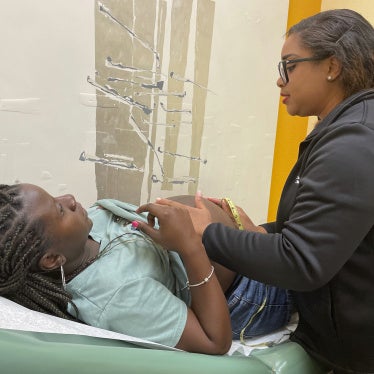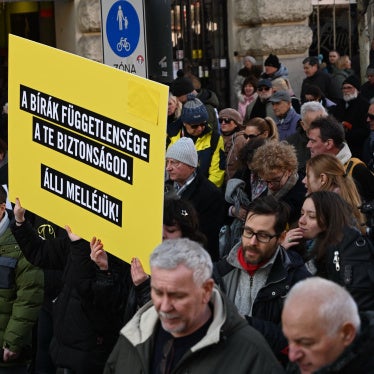This letter requests that President Bush prioritize the specific progress on accountability for human rights abuses in Chechnya and on access for international monitors to the region as part of the United States policy toward Russia and part of the agenda for the summit with President Putin.
Accountability
Prosecuting the perpetrators of crimes against civilians committed by servicemen in Chechnya would be the best indicator that the Russian government is committed to justice, preventing abuses, and enforcing military professionalism and discipline. This, in turn, would foster an environment conducive to eventual reconciliation. But Russian efforts to date provide no such indication. To the best of our knowledge, none of the 293 criminal cases investigated by the civilian procuracy and police has been tried. Of the sixty-five cases handled by the military procuracy, few appear to relate to torture, summary execution, arbitrary detention, and forced disappearances-the main abuses perpetrated in this conflict. Seven have been tried in court, resulting in one active prison sentence (for manslaughter); many others have been either suspended or dismissed, or referred to local law enforcement agencies.
The Russian authorities have offered the high-profile trial of Yuri Budanov-a former colonel and tank commander charged with abducting and murdering an eighteen-year-old Chechen woman-as proof of their commitment to accountability. But Budanov's high-profile trial is an exception. No progress has been made on investigating three massacres perpetrated by Russian forces in 1999 and 2000, which killed at least 130 civilians. At least 150 civilians have "disappeared" after being taken into Russian custody, but not one of the opened investigations has located a single victim or identified a single perpetrator.
The meagerness of these efforts has encouraged continued abuses. The discovery of a mass dumping ground of fifty-one bodies at the end of February 2001 near Russia's main military base in Chechnya is the latest evidence. As Human Rights Watch has reported, of the nineteen bodies identified, sixteen had been extrajudicially executed. Yet autopsies on these bodies were incomplete and important evidence was not collected.
Russia's high-level command has so far escaped scrutiny for any complicity in abuses and for its failure to prevent them. Minister of Defense Sergei Ivanov's recent expression of personal sympathy for Budanov suggests little scrutiny can be expected. It is also instructive to note the treatment of Gen. Vladimir Shamanov, whose forces committed a well-documented massacre of civilians in Alkhan-Yurt in December of 1999. Although relieved from duty in Chechnya soon after the Alkhan-Yurt massacre, Shamanov nonetheless received the Hero of Russia award, and successfully ran for governor of Ulianovsk, reportedly at the Kremlin's bidding.
We applaud your administration's strong support for this year's United Nations Commission on Human Rights resolution on Chechnya, which condemned the slow pace of investigations into these abuses. We ask that you press President Putin for implementation of the resolution, by opening an investigation into the responsibility of General Vladimir Shamanov for the abuses committed in Alkhan-Yurt, and by providing a detailed accounting of investigations and prosecutions of human rights violations, including of the mass dumping site in Chechnya.
Access for international monitors
International monitors in the region can help fill the void left by Russia's poor record on accountability. U.N. thematic rapporteurs or representatives on summary executions, forced disappearances, torture, and arbitrary detention should visit Chechnya. Taken together, their authoritative reports constitute the best chance for an official record of some of the worst abuses perpetrated in the conflict. Also, the deployment of the Organization for Security and Cooperation in Europe's Assistance Group to Chechnya would provide sustained international monitoring. The U.N. resolution called on Russia to allow both sets of monitors to work in the region.
The Russian government has repeatedly failed to live up to its promise to allow the redeployment of the Assistance Group. In the past, each public commitment-including that made by Foreign Minister Ivanov last month to Secretary of State Powell-was followed by lame excuses and obfuscation. We hope the Russian Foreign Ministry's announcement yesterday that the Assistance Group will be redeployed next week will mean that the monitors are actually on their way to the region by the time you meet with President Putin on Saturday. Meanwhile, Russian authorities have consistently and flatly refused to grant invitations to the U.N. monitors mentioned above. We hope that you will press President Putin to issue invitations to U.N. monitors by July's G-8 summit. You should also signal that the deployment of OSCE monitors is not an end in itself, but a means to secure human rights improvements and progress on accountability.
Beyond the Summit
Your administration has rightly stressed that Russia will not be fully accepted by the international community until it respects the rights of its people. But Russia may discount that message unless it is consistently delivered by the United States and its European partners. We hope you will raise the need to speak with one voice on Chechnya when you meet with European leaders on the other stops of your trip. Because Russia will exploit our differences and inconsistencies, we hope your administration will coordinate with the E.U. its benchmarks for progress in Chechnya.
In the long run, your message may also be undermined if Russia feels that its conduct in Chechnya has no practical consequences in its relationships with key partners.
For example, Russia will again share the world stage with the United States at the G-8 summit in July. In order to come to the table as a worthy member of this distinguished group of the world's leading democracies, the Russian government should be urged to take concrete steps toward compliance with the U.N. resolution and the creation of a meaningful accountability process.
The conduct of Russia's military in Chechnya should also raise serious questions for continued military cooperation with the U.S. in such areas as Partnership for Peace and Balkans peacekeeping. The United States must scrutinize the Russian military's lack of discipline and professionalism in the Chechnya campaign, examine the record of specific Russian units with which it may have military contacts, and emphasize the need for accountability in the context of the U.S.-Russia joint military contact program.
Ultimately, the growing military and security cooperation you envision between the United States and Russia requires a frank assessment of whether, in light of its record in Chechnya, the Russian military is indeed a worthy partner. A military that decorates officers whose troops have murdered, raped, and looted surely is not a military with which the United States should carry on business as usual. The nature and degree of U.S. cooperation with the Russian military should depend on progress on these issues.
Please do not hesitate to contact us if you or your staff has any questions regarding our findings or recommendations. Thank you for your attention to these concerns. We wish you a productive summit.
Sincerely,
Holly Cartner
Executive Director
Europe and Central Asia Division
Tom Malinowski
Washington Advocacy Director








